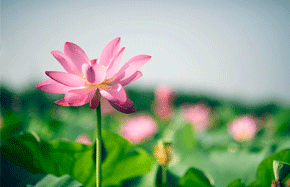Tibetan artist nurtures his culture
 |
|
Nyima Tsering incorporates traditional Tibetan cultural elements, such as colors, forms and aesthetic styles, into his art. [Photo Provided to China Daily] |
Lamaseries, folk artists, murals and thangka paintings all enriched Nyima Tsering's works that were exhibited in many countries.
He also shares stories about the painting show in New Delhi, India, where Tibetans living in India were impressed by the authenticity of his Tibetan paintings. Nyima Tsering believes that he can best explore and protect Tibetan ethnic culture in China.
"Great changes have happened in Tibetan areas," he tells foreign audiences. He insists on wearing a typical Tibetan hat when meeting with photographers, saying it an important part of his cultural exclusivity. But he seemed tolerant enough when talking about the popularity of Western clothes among young Tibetan people.
"Tibetans should be open-minded to technology. Living Buddhas in remote areas spread CDs about expounding the teachings of Buddhism, and there are also electric prayer wheels nowadays."
Nyima Tsering is happy Tibetan painting has changed from being a purely religious art form restricted to the lamaseries to a broader genre reflecting common people's lives since the 1990s.
"Tibetan Buddhism values high life, advocates every living creature is equal, and in my paintings I also try to present that mountains also experience the cycle of life," he says.
"We should draw strength from traditional Tibetan cultural elements, such as colors, forms and aesthetic styles, to turn them into a kind of art language that can be better appreciated by the international audience," Nyima Tsering says.
Related:
Chinese artist exhibits Tibetan mastiff paintings in St. Petersburg
| Painter Li Xiaoke finds spiritual home in Tibet | Master strokes |

























